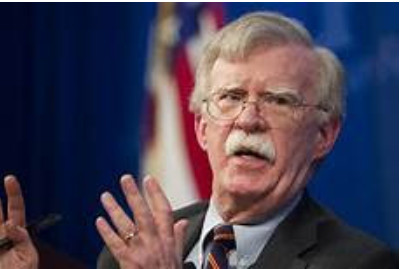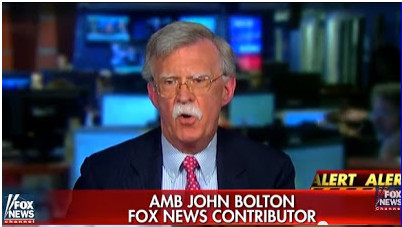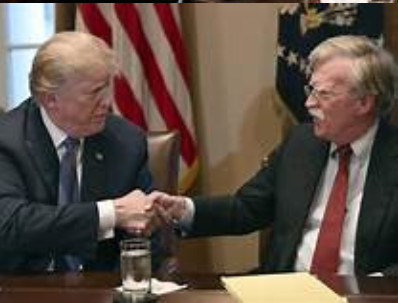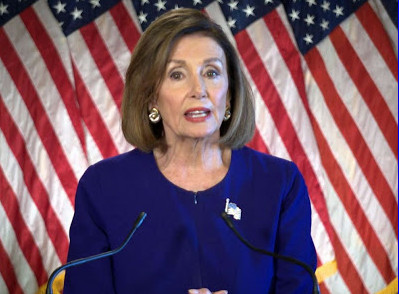John Bolton, a figure synonymous with conservative foreign policy and known for his hawkish stances, stepped into the tumultuous world of the Trump administration as National Security Advisor in April 2018. His tenure, lasting just seventeen months, provided him with a front-row seat to the inner workings of a presidency that defied norms and courted controversy. Bolton’s subsequent book, “The Room Where It Happened,” offers readers an extensive and detailed account of his experiences within this administration, quickly becoming a focal point for those seeking to understand the Trump White House.

Bolton’s journey to becoming Trump’s National Security Advisor was not straightforward. Initially considered for various roles after Trump’s 2016 election victory, Bolton, a Republican political veteran, television commentator, and former United States Ambassador to the United Nations, held out for a position of significant influence. Trump, recognizing Bolton’s effectiveness as a communicator of Republican viewpoints, particularly on television, eventually appointed him as National Security Advisor. This alliance, however, was destined to be short-lived due to fundamental differences in policy and approach.
Bolton’s memoir meticulously chronicles his time amidst the high-stakes decision-making processes of the Trump administration. The book delves into countless meetings, interactions, and policy debates, offering readers an unprecedented glimpse into “The Room Where It Happens.” He recounts discussions with President Trump, cabinet members, and a host of international counterparts, painting a picture of a White House often driven by impulsive decisions and personal agendas. Beyond just a recounting of events, Bolton interweaves his own perspectives on American foreign policy and sharply critiques the actions and motivations of key figures, including President Trump himself.

One of the striking aspects of Bolton’s narrative is his candid assessment of global leaders. His gossipy anecdotes, such as South Korea’s President Moon Jae-in’s attempts to insert himself into Trump-Kim Jong Un summits, add a layer of intrigue to the weighty matters of international diplomacy. While the book is praised for its clear and engaging writing style, some critics have pointed to its extensive detail, particularly regarding travel logistics, as contributing to a sense of bloat. Nevertheless, Bolton’s intellect and wide-ranging knowledge are evident throughout, as he frequently incorporates quotes from notable figures to bolster his arguments and observations.
Bolton’s deeply ingrained self-confidence and unwavering belief in his own perspectives are palpable throughout “The Room Where It Happened.” This characteristic, while perhaps contributing to his effectiveness in advocating for his policies, also placed him at odds with numerous other high-ranking officials within the Trump administration. He describes clashes with figures like Defense Secretary Jim Mattis, U.N. Ambassador Nicki Haley, and others whose visions for American policy diverged from his own.
A central tension within Bolton’s narrative is the frequent divergence between his recommendations and President Trump’s decisions. Bolton advocated for a firm stance and robust sanctions against nations perceived as adversaries, including Iran, North Korea, and Russia. In contrast, Bolton portrays Trump as often prioritizing deal-making and personal political gains over consistent foreign policy objectives. Bolton recounts numerous instances where he felt compelled to rein in President Trump from making concessions that he believed were detrimental to U.S. interests.

Conversely, Bolton highlights instances where their policy preferences clashed in different directions, such as regarding Ukraine. Bolton favored providing aid to Ukraine, while Trump allegedly conditioned such assistance on Ukraine initiating an investigation into Hunter Biden, a demand that ultimately led to impeachment proceedings. This episode is just one example of the many policy clashes detailed in “The Room Where It Happened,” illustrating the internal conflicts and competing priorities within the Trump administration.
Bolton’s critical perspective extends beyond policy disagreements to encompass his disdain for the press, with the exception of conservative media outlets, and a consistently negative view of the Obama administration’s legacy. These biases are openly present in his writing, shaping his analysis of events and personalities.
“The Room Where It Happened” is rich with revealing anecdotes and direct quotes that illuminate Bolton’s perspectives and experiences. For example, regarding media coverage of Trump’s Syria policy, Bolton critiques the “inconsistencies within Trump’s own thinking, and reporting based on second- and third-hand sources,” highlighting the chaotic policy-making environment within the White House. He likens formulating policy in that environment to “making and executing policy inside a pin-ball machine, not the West Wing of the White House.”
In another telling comparison, Bolton contrasts President Trump’s approach to presidential briefings with that of President George H.W. Bush, whom he deeply admired. He notes the meticulously structured schedule of Bush, lamenting that Trump typically had only two intelligence briefings per week, often dominated by Trump’s own tangential remarks. This anecdote underscores Bolton’s perception of a lack of structured and informed decision-making under Trump.
Bolton also reveals his frustrations with bureaucratic inertia and lack of strategic economic policy within the administration. Describing efforts to coordinate a response to Chinese telecom giant ZTE’s criminal activities, Bolton laments the departments’ preference for “policy-making roulette” over disciplined processes, concluding that international economic policy remained “utterly unstructured.”
Perhaps one of the most politically explosive revelations in “The Room Where It Happened” is Bolton’s account of President Trump allegedly pleading with Chinese President Xi Jinping to assist in his re-election efforts. Bolton claims Trump “pleaded with Xi to ensure he’d win,” emphasizing the importance of Chinese purchases of soybeans and wheat to appeal to American farmers, a key voting bloc.
Bolton’s critique extends to President Trump’s handling of the COVID-19 pandemic. He points out the administration’s initial downplaying of the virus’s severity and its potential economic impact, noting that “Trump’s reflex effort to talk his way out of anything, however, even a public-health crisis, only undercut his and the nation’s credibility.”
Regarding Iran policy, Bolton emphasizes Trump’s frequent complaints about allied nations not doing enough to pressure Iran. Bolton argues that unilateral U.S. sanctions were indeed crippling Iran’s economy, contrary to the views of European allies and proponents of the Obama-era nuclear deal. He expresses regret that they couldn’t persuade Trump to further intensify economic pressure on Iran.
Bolton also recounts Trump’s recurring suspicion that he was being deliberately isolated from foreign leaders who wished to communicate with him, such as the leaders of Iran and Russia. Bolton dismisses these claims, suggesting they were often based on flattery and manipulation tactics employed by figures like North Korea’s Kim Jong Un, who Bolton argues astutely played to Trump’s vanity.
The book also touches on President Trump’s fixation on prosecuting former Secretary of State John Kerry for allegedly violating the Logan Act. Bolton dismisses this idea as legally unsound, noting the Act’s likely unconstitutionality.
In a particularly telling episode concerning the downing of a U.S. drone, Bolton expresses his frustration with what he perceived as a lack of decisive response. He attributes the inaction partly to bureaucratic caution and a lack of resolve, especially from a president whose views he characterizes as frequently changing.

Bolton is highly critical of the Trump administration’s February 2020 deal with the Taliban, viewing it as a risky “Obama-style deal” that legitimized the Taliban and sent the wrong message to America’s enemies. He predicts that the full negative consequences of this agreement may only become evident after Trump’s departure from office.
Reflecting on the broader implications of his experience, Bolton observes that Ukraine, seemingly “an unlikely place as a battleground to imperil an American presidency,” became central to Trump’s impeachment. He concludes that Trump’s presidency was characterized by a tendency to prioritize personal interests and act on limited information.
Bolton further alleges that Trump exhibited a pattern of offering “personal favors to dictators he liked,” citing examples such as downplaying criminal cases involving entities like Halkbank and ZTE. He recounts briefing Attorney General Barr on these concerns, noting Barr’s own unease about the appearances Trump was creating.
Bolton also defends his decision not to testify during the House impeachment hearings, arguing that the proceedings were rushed and politically motivated, preventing a more comprehensive investigation into Trump’s potentially inappropriate actions across various domains. Despite his criticisms of the impeachment process, Bolton acknowledges the validity of the core concerns regarding Trump’s conduct.

Even the attempts to suppress publication of “The Room Where It Happened” are detailed by Bolton, who describes the Trump administration’s efforts to seize documents, obstruct his social media, and threaten censorship. Bolton frames his response to these actions as “Game on,” suggesting a defiant stance against presidential pressure.
“The Room Where It Happened” extends beyond these highlighted episodes to cover a wide array of topics, including Trump’s demands for increased NATO contributions, efforts to oust Nicolás Maduro in Venezuela, and internal debates over military actions against Iran. Bolton’s memoir presents a comprehensive, if decidedly critical, perspective on the Trump administration’s foreign policy and internal dynamics. Regardless of one’s pre-existing opinions of John Bolton, his book provides a valuable, firsthand account of a highly consequential period in American history, making it a worthwhile read for anyone seeking to understand the inner workings of the Trump White House and “the room where it happens.”

